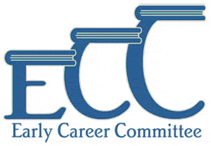
Q&A with Rich Thomas, VP, Publishing Director at HarperCollins Children’s Books | February 27, 2018
By Elizabeth Lynch (ECC Member, HarperCollins Children's Books)

Tell us a little about your role at Harper. What’s your elevator pitch for what you do within the Children’s editorial department—and how does it differ from what other Harper teams do?
The simplest way to sum it up is to say that I lead a team of editors whose goal is to get kids reading using familiar characters, popular brands and inventive formats. We strongly believe that these kinds of books can be gateways for reluctant readers as well as quality reading experiences for avid ones. Our team is different in that the model requires a real varied kind of editorial approach. A relatively small number of the books on our list come from agents. Instead, we partner with licensors and identify writers and, working with design, artists, who are comfortable with a work for hire model, where they don’t hold any rights. We also, through our IP team, HarperInk, develop concepts and characters here in house, and then hire writers and artists to help us develop them into books. For the celebrity books we publish, it’s a matter of identifying up and coming or overnight success stories and approaching them. Finally, the HarperFestival team is committed to publishing quality novelty books, and this requires contacts with packagers and foreign publishers who have expertise in everything from paper engineering to book-plus and product design. So, the main difference is how we source our content. But the editorial process can be different, too—we sometimes write books in house because we can’t share sensitive licensed materials with an outside author, or because we know better than anyone else what our licensors want to see.
What does your day to day look like?
Lots of meetings! 😊 Kidding aside, it depends on the day. Sometimes it’s a day brainstorming new novelty concepts or IP ideas; others it’s meeting with a production team on a film or TV show to get a sense of the DNA of their property so we can carry that over into our books; and every so often I still have an opportunity to edit, which are some of my favorite days! I do spend a lot of time sharing creative guidance with the team, and working with them and Harper’s fantastic design team. I’m always looking at our list to make sure we’re staying true to the philosophy that we’re committed to, which is publishing quality commercial books that’ll get the greatest number of kids hooked on reading. We also have to be nimble—especially with the celebrity and licensed publishing pieces of the job—so I try to spend at least a part of every day reading the trades, watching what’s trending in the social/streaming landscape, and generally keeping my finger on the pulse of pop culture.
What was your first job in publishing? How did you end up doing what you do now?
My first job in publishing was as an Editorial Assistant at the Princeton Review Publishing, which was part of a test-prep company that would give you strategies on how to beat the SATs. Our books were published by Random House so I got my first taste of big league publishing early on. The first books I worked on were AMERICA’S TOP INTERNSHIPS and THE INTERNSHIP BIBLE. I was going to school (undergrad) full time and working about 30ish hours a week. It was exhausting but I found I really loved the editorial process and decided that when I graduated I wanted to stay in publishing. I always loved kids books and comic books / graphic novels, and ultimately wanted to land there. But my first full time job out of college was with Macmillan, where I worked on reference books about pets—dogs, cats, birds, fish, horses, and my favorite—tarantulas! After about two years with Macmillan I moved over to Disney, then to DC Comics and finally back to Disney which is where, of course, I acquired all my kids experience. It was great because we published books on our own, but also licensed books to most of the Big 5 and smaller publishers, so I got to work with people all over the industry at so many different houses. After about 20 years, I found myself here at Harper which given the rich history and amazing frontlist has been a real dream come true.
How do you determine what’s going to work and what isn’t in today’s children’s book market? What have you found are the best ways to strengthen that muscle and develop your own taste?
So much of what we do in this group in particular is watching trends –even outside of publishing—and seeing where our culture in general is going and responding to that. Or, better than that, the holy grail, catch something right before it becomes huge and riding that wave of success. The question of taste is an interesting one as it applies to this kind of publishing: As a child of the 70’s and 80’s I often have to check myself and say, yeah, YOU think this is really cool, but what would the 8 year old reader you’re publishing for think? Those are sobering, and often very depressing moments! 😊
What advice would you give to a young professional in the industry?
I’ll make a pretty blanket statement here, but in my experience you know– intuitively and unambiguously– very early on if this is where you want to be taking your professional life. It won’t always be easy, you’ll have difficult projects, agents, authors, illustrators, and coworkers. But if you know you want to do it then stick with it. Even taking all of those complexities I mentioned into account, I don’t think there’s ever been a night in my whole career where I left the office and asked myself why I chose to do this for a living. On the other hand, if you’re not sure this is what you want to be doing, or if you know this isn’t what you want to be doing, then you might want to evaluate shifting gears while you’re still young. The more entrenched you become in this very tight knit industry the more difficult it becomes to escape it—bwahahahaha!
Just for fun—what’s the one book you wish you had published?
It’s not really a book, so apologies if that’s cheating, but I think it would have been the first Spider-Man comic book, Amazing Fantasy #15. It was an example of one of those rare moments where a throwaway 12-page story turned an entire genre on its head and disrupted and upended an entire industry. And I do believe the kind of story it told—relatable, everyday characters, living in the real world with real problems but finding themselves in extraordinary circumstances—changed the way we tell stories in popular culture not just in books, but across all media. I’d love to do that here at Harper, break new ground, do something that’s not been done before, and set the tone for years or decades to come. The team here is so talented, creative, hard-working and driven that if there’s anywhere something like that could happen it would be here.







